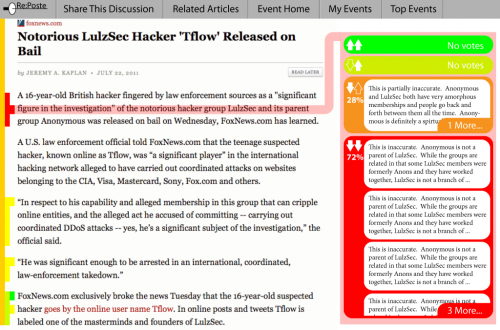 In the final stretch of the competition for the Mozilla-Knight Foundation News Technology Partnership, Still Water Senior Researcher John Bell has posted a roadmap based on applying the lessons of open source software to journalism. His four stages–aggregation, interpretation, curation, and deliberation–lay the foundation for a future of journalism that marries community and credibility.
In the final stretch of the competition for the Mozilla-Knight Foundation News Technology Partnership, Still Water Senior Researcher John Bell has posted a roadmap based on applying the lessons of open source software to journalism. His four stages–aggregation, interpretation, curation, and deliberation–lay the foundation for a future of journalism that marries community and credibility.
[Link]
Each of the four phases is its own semi-autonomous service, taking input data and generating new information about that data. Since each of them could stand on its own, that is how they will be designed. The four phases are independent pieces of software linked through APIs. Better yet, since the APIs are open the four primary phases of Re:Poste can be augmented by new interfaces and modules designed by others. Want a Twitter stream of comments? Go ahead and build one. Think a specific commenter is full of good information? Make an interface that filters by author instead of event. Re:Poste’s internal flexibility is also an external asset, so the power of its commenting and trust systems can be applied wherever and however users think they make the most impact.
Re:Poste’s target is not limited to a specific newsroom or journalist; instead, it assumes that journalism is not definitively authoritative and directly addresses the needs of democratic society that journalism is supposed to support. With the modern multitude of news sources, it is possible to gain a larger view of an event than any one source can provide. Re:Poste, while privileging articles from established sources, also subjects them to critique and believes that end users have valuable contributions to make. When all informed voices are heard, everybody benefits.
As I noted in a comment, the suggestion that each of the four stages could interlink via an API means each stage could also serve as the source for a third-party project. This open architecture makes Re:Poste more like a software toolkit for innovative journalism than a single Web site or app.
